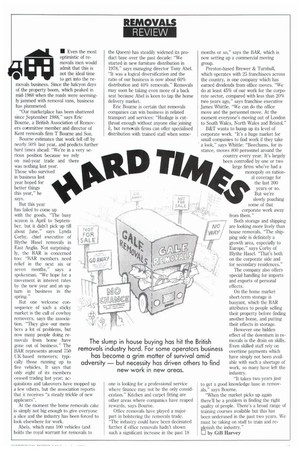REMOVALS REVIEW
Page 39

If you've noticed an error in this article please click here to report it so we can fix it.
• Even the most optimistic Of removals men would admit that this is not the ideal time to get into the removals business. Since the halcyon days of the property boom, which peaked in mid-1988 when the roads were seemingly jammed with removal vans, business has plummeted.
"Our marketplace has been shattered since September 1988," says Eric Bourne, a British Association of Removers committee member and director of Kent removals firm T Bourne and Son.
Bourne estimates that work fell off by nearly 50% last year, and predicts further hard times ahead; "We're in a very serious position because we rely on mid-year trade and there was nothing last year. Those who survived in business last year hoped for better things this year," he says.
But this year has failed to come up with the goods. "The busy season is April to September, but it didn't pick up till about June," says Lynda Corby, chief executive of Blythe Hasel removals in East 'Anglia. Not surprisingly, the BAR is concerned too: "BAR members need relief in the next six or seven months," says a spokesman. "We hope for a movement in interest rates by the new year and an upturn in business in the spring."
But one welcome consequence of such a sticky market is the cull of cowboy removers, says the association. "They give our members a lot of problems, but now many people doing removals from home have gone out of business." The BAR represents around 750 UK-based removers; typically those running up to five vehicles. It says that only eight of its members ceased trading last year; acquisitions and takeovers have mopped up a few others, but the association reports that it receives "a steady trickle of new applicants".
At the moment the home removals cake is simply not big enough to give everyone a slice and the industry has been forced to look elsewhere for work.
AbeIs, which runs 100 vehicles (and holds the royal warrant for removals to NOT
FOR SALE I
the Queen) has steadily widened its product base over the past decade: "We started in new furniture distribution in 1978," says managing director Tony Abel. "It was a logical diversification and the ratio of our business is now about 60% distribution and 40% removals." Removals may soon be taking even more of a back seat because Abel is keen to tap the home delivery market.
Eric Bourne is certain that removals companies can win business in related transport and services: "Haulage is cutthroat enough without anyone else joining it, but removals firms can offer specialised distribution with trained staff when some one is looking for a professional service where finance may not be the only consideration." Kitchen and carpet fitting are other areas where companies have reaped rewards, says Bourne.
Office removals have played a major part in bolstering the removals trade. "The industry could have been decimated further if office removals hadn't shown such a significant increase in the past 18 months or so," says the BAR, which is now setting up a commercial moving group.
Preston-based Brewer & Turnbull, which operates with 25 franchisees across the country, is one company which has earned dividends from office moves. "We do at least 45% of our work for the corporate sector, compared with less than 20% two years ago," says franchise executive James Whittle. "We can do the office move and the personnel move. At the moment everyone's moving out of London to South Wales, North Wales and Bristol," B&T wants to bump up its level of corporate work. "It's a huge market for small companies to find work if they take a look," says Whittle: "Beechams, for instance, moves 800 personnel around the country every year. It's largely been controlled by one or two large firms who've had a monopoly on national coverage for the last 200 years or so. But we're slowly poaching some of that corporate work away from them."
Both storage and shipping are looking more lively than house removals. "The shipping side is definitely a growth area, especially to Europe," says Corby of Blythe Hasel. "That's both on the corporate side and for secondary residences."
The company also offers special handling for imports and exports of personal effects.
On the home market short-term storage is buoyant, which the BAR attributes to people selling their property before finding another home, and putting their effects in storage.
However one hidden effect of the downturn in removals is the drain on skills. Even skilled staff rely on overtime payments which have simply not been available with such a shortage of work, so many have left the industry.
"It takes two years just to get a good knowledge base in removals," says Bourne.
"When the market picks up again there'll be a problem in finding the right quality of people. There's a broad range of training courses available but this has been underused in the past two years. We must be taking on staff to train and replenish the industry."
11 by Gill Harvey




























































































































